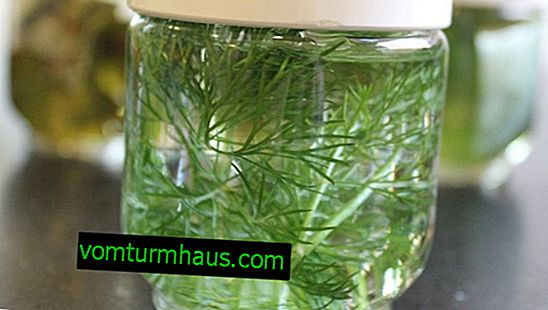Vitamin composition of dill
Fresh dill contains a lot of vitamins. It has long been used not only as a seasoning, but also as a healing remedy. What kind of vitamins and minerals contains dill, and also whether it is useful to everyone, read below.
What vitamins does dill contain?
Vitamin composition of the green mass of the plant:
- ascorbic acid - 100 mg;
- beta-carotene - 1.2 mg;
- Vitamin E - 1.3 mg;
- retinol acetate - 1 mg;
- B vitamins - 1 mg;
- vitamin PP - 1 mg.

The greenery of the plant also contains a whole complex of trace elements necessary for the normal functioning of the human body:
- calcium;
- potassium;
- phosphorus;
- sodium;
- iron;
- zinc;
- manganese;
- copper.
Important! The energy value of dried dill is three times higher than fresh.
In 100 g of the product, only 40 kcal, which accounts for:
- carbohydrates - 6.5%;
- proteins - 2.9%;
- fat - 0.6 %%
- water - 85.5%.

Healing properties
The use of dill has a beneficial effect on the whole body.
- Vitamin-mineral complex allows you to:
- gently cleanse the body of toxins and cholesterol;
- accelerate the removal of urine, which helps to cleanse the body of toxins and reduce swelling;
- improve the state of blood vessels by reducing pressure on their walls;
- increase the body's ability to regenerate;
- relieve spasms;
- improve the condition of the nervous system;
- relieve inflammation;
- increase the body's resistance to infections;
- improve the efficiency of the endocrine system, which allows you to restore the regular cycle in women, eliminate pain and increase potency in men;
- eliminate acne due to antiseptic properties;
- improve the condition of the skin and heal wound surfaces.
Basic rules and norms of use
Young herbs are rich in essential oils and bitterness, in order to feel their beneficial effects on the body, you need to consume products in a dosed manner. It is permissible to use no more than 1 bunch of dill weighing 50–70 g per day, if the goal is to simply increase immunity, enrich yourself with vitamins or revitalize the dish. It is not worth consuming greens constantly, you need to take at least a week break or change the type of greens. Did you know? The essential oil contained in dill is equal in value to pink and is also actively used in the manufacture of perfumes. The use of greens in the form of broths for the treatment of various diseases suggests a norm of not more than 0.5 liters, divided into several doses. The course of treatment with decoctions should not exceed 14 days. After a break of 20-30 days, you can resume the course.
Nursing mothers can introduce dill into their diet on the 7th day after the birth of the baby. The daily intake of greens should not exceed 50 g.

If a decoction of dill is intended for an infant, then initially its dosage should not exceed 1 tsp. in a day. If there is no negative reaction, then it is increased to 3 tsp. at the same time, gradually and carefully observe the condition and behavior of the baby.
In addition to the norm of use, it is worth considering that greens are very susceptible to nitrates and accumulate them in the ground part, so you need to buy dill only from a trusted seller or grow it yourself.
Important! Any greens, and dill is no exception, has a laxative effect, so its use in unlimited quantities can cause diarrhea.
Indications for use
Greens are used not only in traditional medicine, but also in the traditional as an adjuvant to the main treatment, as well as in the diet.
The main indications for the use of dill and decoctions of it:
- decreased overall protective functions of the body;
- diseases of the lungs and bronchi of an infectious nature;
- cystitis;
- candidiasis;
- stool disorders;
- flatulence;
- bloating;
- severe menstrual pain;
- headache;
- decreased potency in men;
- gastric colic in children;
- increase in blood pressure;
- neurosis and post-stress state;
- varicose veins accompanied by swelling;
- diabetes.

Contraindications
Eating greens is not equally beneficial for everyone. It is better to exclude it from your diet altogether or use it in minimal amounts for people prone to hypotension, since the essential oils contained in the plant contribute to lowering the pressure. It is also worth abandoning it to people with individual intolerance to this product or plants similar to it. Dill can harm the body if you use it fresh with an exacerbation of various gastrointestinal diseases, accompanied by an increase in acidity.
To avoid unpleasant incidents after eating greens, you need to start using it with 1-2 branches and carefully monitor your feelings. In general, the negative effects of dill are extremely rare. If we consider the percentage, then in only 10% of cases.
Important! Before using herbal decoctions of dill for medicinal purposes and in the diet, be sure to consult a specialist. Dill is an extremely useful plant. It has long been used not only as a seasoning, but also for medicinal purposes. The medicinal effect determines the rich vitamin composition and the presence of essential oils.




